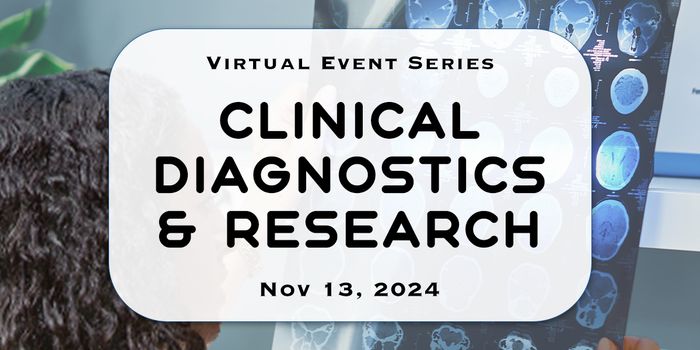Continuing Education Credits
By participating in our virtual events and webinars, you can earn Continuing Education credits. Each event offers different educational credits based on the content of the event and the eligibility of the presentation.
Show More
-
NOV 13, 2024 | 6:00 AM PSTC.E. CREDITSLabroots is excited to announce the 15th Annual Event in the Clinical Diagnostics & Research Virtual Event Series! This event will again bring together clinicians, researchers, medical e...
-
If you use a pipette on a daily basis, then this webinar is for you. Pipettes are used to prepare samples, blanks, and standards for a range of analytical experiments. This is why the wrong...
NOV 13, 2024 | 10:00 AM
C.E. CREDITS
In 2022, there were approximately 1.4 million new cases of prostate cancer reported globally and over 397,000 deaths reported globally. PSA testing can have significant value in detecting me...
NOV 13, 2024 | 10:00 AM
C.E. CREDITS
Capillary Electrophoresis is one of the newer methods for the detection and evaluation of hemoglobinopathies. It improves upon the alkaline gel electrophoresis platform with a similar migrat...
NOV 13, 2024 | 9:00 AM
C.E. CREDITS
Cancer research is advancing rapidly, but the complexity of managing data, fostering collaboration, and optimizing workflows presents significant challenges to research teams. In this webina...
NOV 13, 2024 | 8:00 AM
C.E. CREDITS
According to the CDC, in the United States, approximately 14.7% of adults have Diabetes, and another 10.8% have prediabetes. Unfortunately, as many as 8.7 million adults aged 18 years or old...
NOV 12, 2024 | 9:00 AM
C.E. CREDITS
These are exciting times to be a microbiologist with all the new options for rapid testing platforms and automated instrumentation. Making the move to an automated lab seems daunting, howeve...
OCT 30, 2024 | 8:00 AM
C.E. CREDITS
Predicting patient outcomes in cancer treatment is key to creating personalized and effective therapeutic plans. Join Dr. Osman in this engaging webinar as she delves into the cutting-edge w...
OCT 24, 2024 | 5:00 AM
C.E. CREDITS
Urinalysis is a major diagnostic screening test in the clinical laboratory, with an important role in diagnosing and monitoring nephrological and urological conditions. Until recently, micro...
OCT 23, 2024
| 7:00 AM PDT
C.E. CREDITS
Labroots invites you to the 7th Annual Event in the CRISPR Virtual Event Series 2024 ! This event will continue the conversation of the abilities of CRISPR-based editing, next-gen editing to...
Identifying and verifying low frequencies of genomic alterations resulting from off-target editing, gRNA synthesis errors, cross-contamination, or other unintended gRNA activity is critical...
CRISPR has emerged as a promising alternative to viral-based gene editing by allowing scientists to modify genes with unprecedented ease and flexibility. The discovery and development of a d...
Directing nucleobase deamination or removal can generate precise genomic edits without double-stranded DNA breaks. However, a much broader spectrum of DNA chemical modifications is available...














































